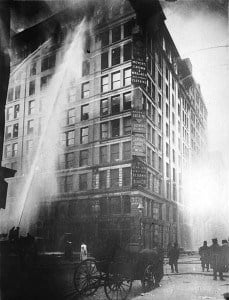Today’s Throwback Thursday reminds us that cramped and unsafe working conditions, government patronage, threats against employees, cheap labor, and desperate workers were just as commonplace in the West as they are Bangladesh. While we have seen some good news coming from Dhaka, Bangladesh in the past few days, most of the world’s attention has been focused on the horrors of the tragically “avoidable” collapse of five garment factories in the Rana Plaza there. At the time of this writing, the death toll stood at over 1,000 while the survivors number over 2,400 – interesting when one considers that this adds up to over 3,400 persons, a figure greater than the government’s estimates of Rana Plaza employees.
A century ago, another notable sweatshop employed poor women, regulated employee activity tightly, and ended in tragedy. Business was drawing to close on March 25, 1911 for the employees for the Triangle Shirtwaist Factory in Manhattan when a spark ignited highly-flammable scraps of linen. Ten minutes later, the building was engulfed in flames and 146 workers – mostly immigrant women and girls – perished.
Thanks to Cornell University’s School of Industrial and Labor Relations, Triangle can remain in America’s consciousness. The school has put together an interactive, online exhibit detailing everything from the labor struggles leading to the Triangle disaster to eventual ramifications. Hear the survivors’ stories, check out the floorplan of the fatal 9th floor, and view photo after eerie black and white photo of Triangle and its workers. When one combines this exhibit with David von Drehle’s heartbreaking and vivid account of the fire, the numbers become names with families, dreams, fears, and hopes for a life that were senselessly dashed. Multiply Triangle’s numbers by ten and we have Rana Plaza.
From the ashes in Greenwich Village rose the phoenix that sought reforms and justice for workers in the United States in the twentieth century. One can only hope this happens for the Bangladeshis in our current century.
—//—
Cover image of Bangladeshi garment factor via WikiCommons.



